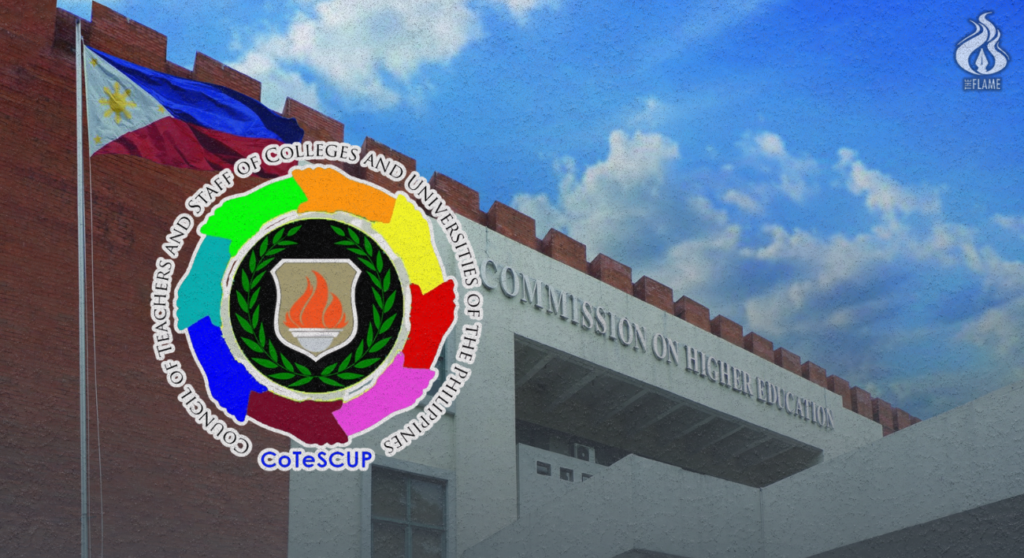
FACULTY UNIONS from different private schools have urged the Commission on Higher Education (CHED) to address concerns over universities’ compliance with tuition hike share policies, saying the issue may spiral into a “national education crisis” if not acted upon immediately.
The Council of Teachers and Staff of Colleges and Universities of the Philippines (CoTeSCUP) slammed CHED for its alleged inaction on issues related to the distribution and allocation of tuition increase, claiming they have been “mismanaged or withheld” by some universities, including UST.
“CHED’s silence is alarming… Without immediate CHED intervention, this crisis will only escalate,” CoTeSCUP president Asst. Prof. Rene Luis Tadle, who also heads the UST Arts and Letters Faculty Association, said in a statement issued on April 5.
“Faculty unions across the country, from Silliman University and Centro Escolar University, to the recent labor actions at the University of Santo Tomas (UST) and Lyceum of the Philippines University (LPU), have been highlighting persistent violations and unfair practices. Yet, CHED remains unresponsive to these systemic problems.”
In February, the labor coalition sought dialogues with CHED Chairman Prospero De Vera, III to discuss matters on tuition increases, including delays in distribution, lack of transparency in fund use and inadequate regulatory oversight.
The labor coalition called out CHED and the Department of Education the following month for “repeatedly deferring” reforms in its policies concerning the allocation and distribution of tuition hike shares. Such lapses enabled the “continued exploitation” of private school workers, it said.
CoTeSCUP also assailed the education regulators’ alleged misallocation of state subsidies, neglect of monitoring systems and the lack of structured policies to implement wage standardization and regulate workers’ salary.
No progress or update has been made regarding the policy review despite the creation of a technical working group tasked to look into CHED’s implementing guidelines on tuition increase, the coalition said.
It urged the commission to hold a dialogue with affected stakeholders, provide an update on the technical working group and enforce stricter compliance measures on its policies as the delays in salary increases and benefits are creating “financial distress and labor unrest.”
On March 7, CHED issued a show-cause order requiring the UST administration to submit a written explanation detailing its compliance with three provisions of Republic Act (RA) 6728 and CHED Memorandum No. 03, s. 2012. Both mandate the allocation of 70% of the private schools’ tuition hike to faculty members.
The move stemmed from the University’s dispute with its faculty union over unresolved provisions in the collective bargaining agreement (CBA), including the allocation and distribution of the faculty’s tuition increase shares and the source of the P26 million fund for salary restructuring and rank upgrades.
UST has clarified that the issuance of the order does not imply wrongdoing, but is part of the commission’s standard process that allows the University to demonstrate its compliance with the policies.
The UST Faculty Union filed a strike notice before the labor department after CBA negotiations reached a deadlock.
Faculty members from the LPU also lodged a strike notice to DOLE after a deadlock declaration in their negotiations. Aside from increase in salaries and allowances, LPU faculty called for the removal of its 20-year faculty service limit policy.
According to CoTeSCUP, the cases represent a “growing national crisis in private higher education labor relations.”
“As of this press release, CHED has not yet responded to CoTeSCUP’s urgent requests for dialogue and intervention, leading to increased frustration among educators,” it said in a frequently asked questions document.
“If CHED continues to ignore these urgent issues, educators and unions will consider intensifying their advocacy through public awareness campaigns, peaceful demonstrations, and continued engagement with policymakers and stakeholders to press for lawful compliance and accountability.” F



